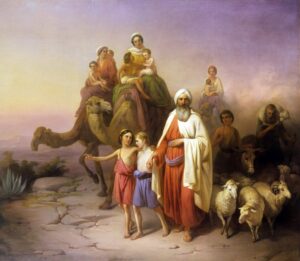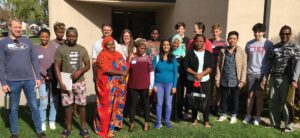
A Faith For the One Who Journeys
 In a recent English class I was leading with my refugee students, we were discussing the journey of Abraham described in Genesis 12. “Go from your country, your people and your father’s household to the land I will show you,” says the Lord to Abraham. Yahweh goes on to describe the blessings he will extend upon Abraham and his family in order that all nations might know the goodness of the Lord. God chose this one family to begin to restore the blessings of Eden back into a fallen and corrupt world. At this end of redemptive history, we know this story as the foundation of the “Abrahamic Covenant”, the forerunner of the New Covenant in which those of us who are followers of Jesus belong. St. Paul reminds us that believing Gentiles are members of the family of Abraham:
In a recent English class I was leading with my refugee students, we were discussing the journey of Abraham described in Genesis 12. “Go from your country, your people and your father’s household to the land I will show you,” says the Lord to Abraham. Yahweh goes on to describe the blessings he will extend upon Abraham and his family in order that all nations might know the goodness of the Lord. God chose this one family to begin to restore the blessings of Eden back into a fallen and corrupt world. At this end of redemptive history, we know this story as the foundation of the “Abrahamic Covenant”, the forerunner of the New Covenant in which those of us who are followers of Jesus belong. St. Paul reminds us that believing Gentiles are members of the family of Abraham:
“The promise comes by faith, so that it may be by grace and may be guaranteed to all Abraham’s offspring—not only to those who are of the law but also to those who have the faith of Abraham. He is the father of us all.” (Romans 4:16)
But to my English students that Thursday night, another aspect of the narrative hit closer to home. “What do we call a person who moves from one country to another one?” I asked. “An immigrant, right. Is anyone here an immigrant?” Hands shyly began to rise as it slowly dawned on them that their own experiences of migration, often fleeing violence and persecution, were mirrored in the journey of this patriarch of the Christian faith.
I confess that rarely in my Christian life have I spent much time meditating on the reality that the father of our faith was a migrant. But that was such a fundamental aspect of Israelite identity that they were commanded to recite a short rendition of their migrant history every time they brought the firstfruits offering:
“The priest shall take the basket from your hands and set it down in front of the altar of the Lord your God. Then you shall declare before the Lord your God: “My father was a wandering Aramean, and he went down into Egypt with a few people and lived there and became a great nation…” (Deuteronomy 26:4-5).
The sojourning of Abraham and his family homelessly trekking around Mesopotamia, the “wanderings” of Jacob, and the experience of the Israelites as a marginalized “foreign” people group in Egypt, shaped their understanding of who they were. That identity as a migrant people was the basis for their own civil law code as the young nation lived in the Promised Land:
“When a foreigner resides among you in your land, do not mistreat them. The foreigner residing among you must be treated as your native-born. Love them as yourself, for you were foreigners in Egypt. I am the Lord your God.” (Leviticus 19:33-34).
Today our hearts break for the people of Ukraine as we watch the horrible consequences of war. Currently, 5 million refugees, often fleeing with only what they can carry, have made their way to neighboring countries and even here to the United States. We also saw tragedy unfold in Afghanistan as the war there came to end, and we are working to welcome those who have arrived here in Phoenix. Christ Church’s own Welcome Team is providing hospitality and a smiling face as we sponsor one of these resilient Afghan families. Meanwhile, families continue to look to the United States as they flee poverty and violence in other lands. And still more who have come as members of the UN refugee resettlement program have been living near us and working to integrate into American society for years – those from Congo, Myanmar, Syria, and elsewhere. Jenny Yang has written, “Whether someone is from Ukraine, Sudan, the Democratic Republic of Congo, Afghanistan or Burma, our welcome as followers of Jesus should be rooted in a radical hospitality that allows all those who experience violence, suffering, and war to find a place of peace and safety wherever they are.”
The New Testament reminds us that the theme of identifying as “foreigners,” or a migrant people, is not to be relegated to Old Covenant faith. 1 Peter picks up on this theme declaring:
“Once you were not a people, but now you are the people of God; once you had not received mercy, but now you have received mercy. Dear friends, I urge you, as foreigners and exiles, to abstain from sinful desires, which wage war against your soul.” (1 Peter 2:10-11)
May we remember ourselves as a “migrant” people, a people not at home in this world – and as a people who live in solidarity with those who, for whatever reason, find themselves as migrants in our day. Ultimately it was Jesus himself who left his home with the Father to live as an exile in this world, who sojourned, homeless, in a land that was not his true home to extend the blessings of Yahweh to his people. And now he calls us to share in the joy of extending that blessing to the nations of the world.
In Christ,
Ryan Taylor
CCA Parishioner &
ESL Class Lead
Abounding Service
Artwork: Abraham’s Journey from Ur to Canaan – József Molnár, 1850
Hungarian National Gallery. Public Domain.

